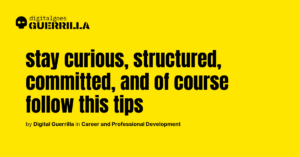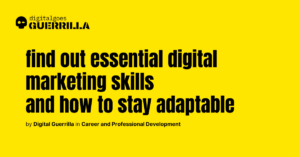Staying ahead requires more than just keeping up—it demands proactive, continuous learning and skill development. For marketers, the challenge is even more daunting. Algorithms change, consumer behaviors shift, and new tools emerge almost daily. So, how can you ensure you’re not only surviving but thriving in this environment?
This post delves into how to approach continuous learning as a sustainable, rewarding, and career-defining strategy. We’ll explore actionable tips, advanced insights, and the hidden nuances of evolving your expertise in a way that keeps you indispensable.
Why Continuous Learning Is Your Most Valuable Career Asset
Imagine this: a marketer from two decades ago trying to navigate today’s world of programmatic advertising, TikTok strategies, or AI-powered tools like ChatGPT. Without constant learning, even the most talented professionals risk becoming irrelevant.
Continuous learning is not just a luxury; it’s a necessity. It keeps you agile, relevant, and primed to seize new opportunities. Yet, despite its importance, many professionals struggle to integrate learning into their packed schedules. The solution lies in treating skill development as a long-term investment rather than an occasional effort.
Embrace Curiosity: The Foundation of Lifelong Learning
The best learners aren’t just diligent—they’re curious. Start by reframing learning as an exploration rather than a chore. Instead of focusing solely on the skills you “must” learn, identify areas of interest that excite you. For instance:
- Cross-disciplinary exploration: If you’re a digital marketer, dabble in data science, UX design, or even psychology. Each of these fields provides perspectives that enhance your primary expertise.
- Emerging trends: Subscribe to newsletters, podcasts, and YouTube channels that discuss what’s next in your industry. For example, staying updated on AI trends ensures you’re future-proofing your skills.
Example in Action: A social media strategist who delved into data analytics found their campaigns delivering higher ROI after leveraging advanced audience insights. Their curiosity bridged a knowledge gap that set them apart from competitors.
Develop a Learning Framework That Works for You
Continuous learning doesn’t happen by chance—it requires strategy. A proven framework involves structure, prioritization, and reflection.
- Set Clear Goals
Identify skills that align with your career ambitions. Use the SMART criteria: specific, measurable, achievable, relevant, and time-bound. Instead of saying, “I want to learn SEO,” aim for “I’ll complete an advanced SEO course and implement changes on three web pages in two months.” - Schedule Dedicated Learning Time
Block out non-negotiable learning hours. Whether it’s 30 minutes daily or a few hours weekly, consistency is key. - Track Your Progress
Use tools like Notion or Trello to document what you’ve learned, resources consumed, and areas still requiring improvement. - Reflect and Apply
Learning without application is wasted effort. Regularly ask, “How can I use this knowledge to solve real marketing problems?”
Leverage Powerful Tools to Supercharge Your Learning
The right tools can transform how efficiently you upskill. Here are some recommendations for digital marketers:
- Skill Development Platforms:
Sites like Coursera, LinkedIn Learning, and Skillshare offer in-depth courses tailored to your needs. For free options, explore HubSpot Academy or Google Digital Garage. - AI-Powered Learning Assistants:
Tools like ChatGPT can provide personalized explanations or even mock interview practice to refine your knowledge. - Communities of Practice:
Join industry Slack groups, LinkedIn communities, or Reddit forums where professionals share insights and resources. - Content Aggregators:
Use Feedly or Flipboard to gather industry news and articles from diverse sources in one place.
Stay Agile by Learning from Real-World Experiences
The best teachers are often your own projects and challenges. Treat every campaign, client project, or failed experiment as a chance to grow.
For example, if a social media campaign underperforms, dissect the analytics to uncover patterns. Were the audience segments too broad? Was the content misaligned with the platform’s culture? Each answer sharpens your skills for the next campaign.
Check also: How do you stay updated on the latest trends and technologies in digital marketing?
List-Based Tips: Top Strategies to Learn More Effectively
Here’s a quick list to supercharge your learning routine:
- Experiment fearlessly: Test out new tools and strategies without fear of failure.
- Teach others: Writing blog posts or mentoring colleagues reinforces your knowledge.
- Microlearning: Use apps like Duolingo-style snippets for technical terms or quick SEO hacks.
- Pair learning with doing: As you learn, apply insights immediately to live projects.
- Rest strategically: Avoid burnout by scheduling mental breaks. The Pomodoro technique works wonders.
FAQs: Your Continuous Learning Questions Answered
Q1: How do I find time for learning in a busy schedule?
Prioritize learning by integrating it into your workflow. For instance, listen to marketing podcasts during your commute or replace one Netflix episode with an online class.
Q2: What skills should I focus on as a digital marketer?
Focus on both foundational (SEO, content creation) and emerging skills (AI tools, blockchain in marketing).
Q3: Can I learn effectively without formal courses?
Absolutely. Many industry leaders are self-taught. Leverage blogs, case studies, and hands-on experimentation.
Conclusion: Make Learning Your Competitive Edge
Continuous learning isn’t just a career strategy—it’s a mindset. By staying curious, structured, and committed, you’re not just adapting to change; you’re driving it. Whether you’re mastering SEO today or exploring AI tomorrow, the key is to stay engaged and proactive.


